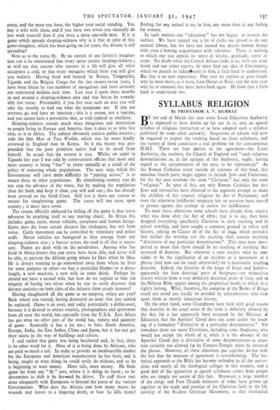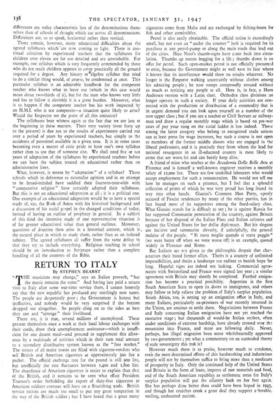SYLLABUS RELIGION
By PROFESSOR A. V. MURRAY
BY the end of March this year every Local Education Authority is expected to have drawn up for use in its area an agreed syllabus of religious instruction or to have adopted such a syllabus published by some other authority. Inspectors of schools will now be required to inspect the teaching based on these syllabuses, and the variety of them constitutes a real problem for the conscientious H.M.I. There are four parties to the agreement—the Local Authority, the teachers, the Church of England and " such religious denominations as, in the opinion of the Authority, ought, having regard to the circumstances of the area, to be represented." As the Roman Catholics stand outside all schemes of this kind, this omnibus fourth party might appear to include Jews and Unitarians, for the Act uses nowhere the term " Christian " but only the term " religions." In spite of this, not only Roman Catholics but also Jews and rationalists have objected to the apparent attempt to make the children of this country religious by Act of Parliament, and even the otherwise indifferent ratepayer has on occasion been roused to protest against this attempt to outlaw his indifference.
To meet these objections some schools have already done exactly what was done after the Act of 1870 ; that is to say, they have dropped everything specifically Christian in their teaching and in school worship, and have sought a common ground in ethics and history, relying on Clause 26 of the Act of 1944, which provides that neither the worship nor the teaching shall contain anything " distinctive of any particular denomination." This they have inter- preted to mean that there should be no teaching of anything that savoured of doctrine. But wherever a man teaches what he con- siders to be the significance of an incident or a movement or a phrase (and how can he teach otherwise?) he is necessarily teaching doctrine. Indeed, the histories of the kings of Israel and Judah— apparently the least doctrinal parts of Scripture—are themselves history written from a very definitely doctrinal point of view, and in the Hebrew Bible appear among the prophetical books to which they rightly belong. What, therefore, the compiler of the Books of Kings could not avoid can hardly be avoided by schoolmasters who look upon them as merely innocuous history.
On the other hand, some Churchmen have held with good reason that doctrine in the usual sense of the term is definitely allowed by the Act, for it has apparently been accepted by the Ministry of Education that the Apostles' Creed does not come under the head- ing of a formulary " distinctive of a particular denomination." Yet nowadays there are many Christians, including some Anglicans, who would not accept the whole of it, while it is the absence of the Apostles' Creed that is distinctive of some denominations—a situa- tion certainly not allowed for by Cowper-Temple when he invented the phrase. However, all these objections put together do not hide the fact that the measure of agreement is overwhelming. The his- torical approach to the Bible has become orthodox in all the univer- sities and nearly all the theological colleges in this country, and a good deal of the opposition to agreed syllabuses comes from people who are simply not aware of this fact. Moreover, a large number of the clergy and Free Church ministers of today have grown up together in the study and practice of the Christian faith in the fel- lowship of the Student Christian Movement, so that theological
differences are today characteristic less of the denominations them- selves than of schools of thought which cut across all denominations. Differences are, so to speak, horizontal rather than vertical.
There remain, however, many educational difficulties about the agreed syllabuses which 'are now coming to light. There is con- tinual criticism by experienced teachers that the syllabuses for children over eleven are far too detailed and are unworkable. For example, one syllabus which is very frequently commended by those who do not teach children appears to cover practically all the ground required for a degree. Any history orlitalgebra syllabus that tried to do a similar thing would, of course, be condemned at once. This particular syllabus is an admirable handbook for the competent teacher who knows what to leave out (which in this case would mean about two-thirds of it), but for the man who knows very little and has to follow it slavishly it is a great burden. Moreover, what is to happen if the competent teacher has his work inspected by an H.M.I. who is not competent—a situation quite likely to arise? Would the Inspector see the point of all this omission?
The syllabuses bear witness again to the fact that we are just at the beginning in these matters. Their very variety (over forty up to the present) is 'due not to the results of experiments carried out over a period of years by experienced teachers, but simply to the accidents of personnel available in a given area. It is in some cases becoming even a matter of civic pride to have one's own syllabus rather than to use that of someone else. We shall need five or ten years of adaptation of the syllabuses by experienced teachers before we can have the subject treated on educational rarher than on administrative lines.
What, however, is meant by "adaptation" of a syllabus? Those schools which in deference to rationalist opinion and in an attempt to be . broad-minded have saddled their fourteen-year-olds with " comparative religion " have certainly adapted their syllabuses. But this is not an educational adaptation at all ; it is a political one. One example of an educational adaptation would be to have a special study of, say, the Book of Amos with his historical background and a discussion of his social gospel in the changed conditions of today, instead of having an outline of prophecy in general. In a subject of this kind the intensive study of one representative situation is of far greater educational value than general outlines. Moreover, questions of doctrine then arise in a historical context, which is , the natural place in which to study them, rather than as an isolated subject. The agreed syllabuses all suffer from the same defect in that they try to include everything. Religious teaching in school should be an introduction to Scripture rather than a complete handling of all the contents of the Bible.



































 Previous page
Previous page